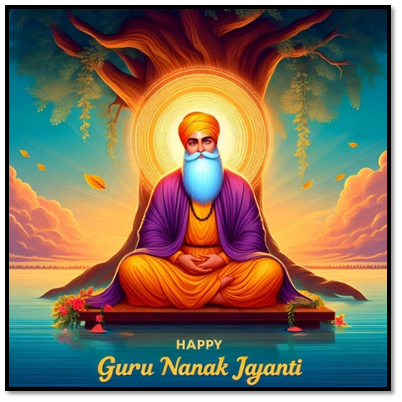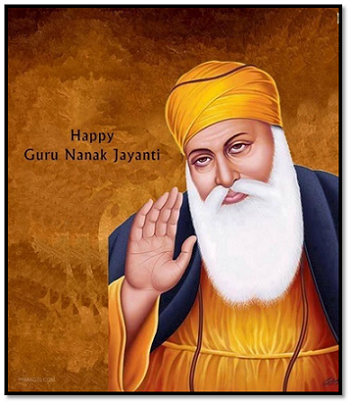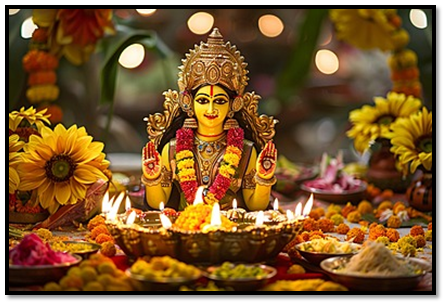Guru Nanak Jayanti: History, Significance, and Celebrations
Guru Nanak Jayanti, also known as Gurpurab or Prakash Utsav, is one of the most significant festivals for Sikhs around the world. It marks the birth anniversary of Guru Nanak Dev Ji, the founder of Sikhism and the first of the ten Sikh Gurus. Celebrated with great devotion, this festival not only commemorates the spiritual leader’s birth but also serves as a reminder of his teachings on unity, equality, humility, and devotion to God.
Guru Nanak Dev Ji was born in 1469 in the village of Rai Bhoi Ki Talwandi, now known as Nankana Sahib in present-day Pakistan. His birth is celebrated on the full moon day of Kartik Purnima, which usually falls in November.
From a young age, Guru Nanak Dev Ji displayed a deep sense of spirituality and questioned the existing social, political, and religious practices. He rejected rituals, caste divisions, and superstitions, focusing instead on the importance of love, compassion, and equality for all. Through his travels across India and other parts of Asia, he spread the message of “Ik Onkar,” meaning “One God,” emphasizing that God is omnipresent and transcends religious boundaries.
Guru Nanak Jayanti is celebrated to honor the birth and teachings of Guru Nanak Dev Ji. His message of love, equality, and service holds great significance in today’s world. Through his teachings, Guru Nanak sought to remove social evils like the caste system, discrimination against women, and religious conflicts. He preached that all human beings, regardless of caste, creed, or gender, are equal in the eyes of God.
Guru Nanak’s teachings are encapsulated in the Guru Granth Sahib, the holy scripture of Sikhism. His three guiding principles — Naam Japna (meditating on God’s name), Kirat Karni (earning an honest livelihood), and Vand Chakna (sharing with others, especially those in need) — remain central to Sikhism and continue to inspire people globally.


Guru Nanak Jayanti is celebrated with fervor by Sikhs worldwide. The celebrations often last for three days and include a mix of religious rituals, prayers, and community service.
- Akhand Path: The celebration typically begins with the Akhand Path, a 48-hour non-stop recitation of the Guru Granth Sahib. The Akhand Path is performed in Gurdwaras and homes, and devotees take turns reading the scripture continuously for two days before the actual day of Guru Nanak Jayanti.
- Prabhat Pheris: Early morning processions called Prabhat Pheris are organized in Sikh neighborhoods. Devotees sing hymns, known as Shabads, while walking through the streets. The singing of Shabads is a central part of the celebration, as it emphasizes the message of devotion to God.
- Nagar Kirtan: A day before the Gurupurab, a grand procession known as Nagar Kirtan is carried out. The procession is led by the Panj Pyare (the Five Beloved Ones) who carry the Nishan Sahib (the Sikh flag). The Guru Granth Sahib is carried in a beautifully decorated palanquin, followed by devotees singing hymns and playing traditional instruments like the tabla and harmonium. The procession often includes martial arts performances by Gatka teams.
4. Kirtan and Discourses: On the day of the Gurupurab, people gather at Gurdwaras for special Kirtan sessions, where devotional songs are sung. Religious discourses and sermons are delivered, focusing on the life and teachings of Guru Nanak Dev Ji.
5. Langar: One of the most significant aspects of the celebration is the Langar, a free community meal that is served at Gurdwaras to all, regardless of religion, caste, or background. The concept of Langar reflects Guru Nanak’s belief in equality and selfless service. Volunteers, known as sewadars, prepare and serve the meals, embodying the spirit of sharing and humility.
6. Illuminations and Decorations: Gurdwaras are beautifully decorated with flowers and lights. In the evening, they are illuminated, creating a festive and serene atmosphere.
Guru Nanak Dev Ji’s teachings continue to resonate deeply in modern society. His message promotes:
1. Unity and Oneness: Guru Nanak believed in the idea of “Ik Onkar”, the oneness of God. He emphasized that all religions are paths leading to the same truth, and all human beings are equal. His teachings encourage harmony and unity, which are particularly relevant in today’s world, where divisions and conflicts often arise due to differences in faith and identity.
2. Equality: Guru Nanak spoke out against the caste system and advocated for the equality of all people, regardless of their social status, gender, or religion. He believed that no one is superior or inferior in God’s eyes.
3. Selfless Service: Through the practice of sewa (selfless service), Guru Nanak encouraged people to serve humanity and help those in need. He taught that true devotion to God comes from serving others and sharing one’s resources with the less fortunate.
4. Living an Honest Life: Guru Nanak preached the value of Kirat Karni, which means earning an honest living through hard work. He believed that leading a life of integrity and honesty was essential for spiritual growth.
5. Meditation and Devotion: Guru Nanak encouraged people to live a life of spiritual awareness through Naam Japna — constant meditation on God’s name. He taught that remembering and connecting with God should be an integral part of daily life. Guru Nanak Jayanti is not just a celebration of a great spiritual leader’s birth but also a reminder of the timeless wisdom he imparted to the world. His teachings of unity, equality, compassion, and devotion to God continue to guide millions of people, irrespective of their religious backgrounds. By celebrating Guru Nanak Jayanti, we honor his life and strive to live by the principles he advocated — building a society based on love, kindness, and harmony.
By: Mr. Karun Basra (Senior Executive – ATF & Insurance)



